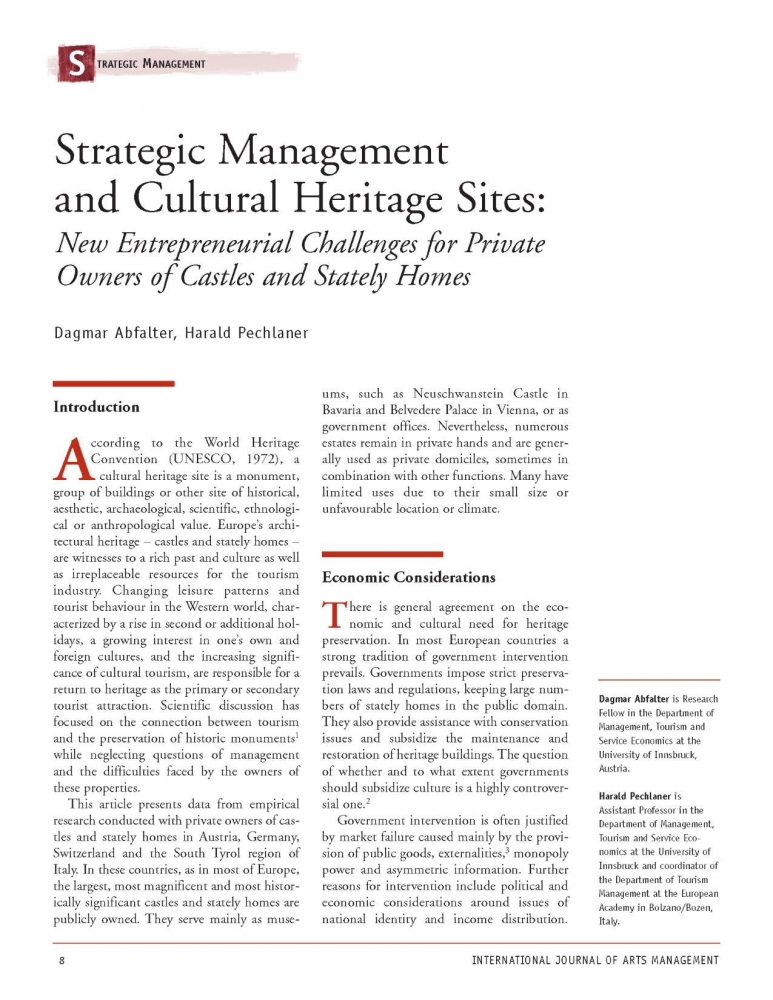Strategic Management and Cultural Heritage Sites: New Entrepreneurial Challenges for Private Owners of Castles and Stately Homes
Produit: Article
21,00 $ CA
Dagmar Abfalter, Harald Pechlaner
Dagmar Abfalter is Research Fellow in the Department of Management, Tourism and Service Economics at the University of Innsbruck, Austria.
Harald Pechlaner is Assistant Professor in the Department of Management, Tourism and Service Economics at the University of Innsbruck and coordinator of the Department of Tourism Management at the European Academy in Bolzano/Bozen, Italy.
ABSTRACT
Although there is general agreement about the need to preserve cultural heritage, private heritage sites such as castles and stately homes are facing severe financial difficulties. This research describes the current situation as well as future prospects for private owners of castles and stately homes in Austria, Germany, Switzerland and the South Tyrol region of Italy. It also points out the complexity of the conflict between tradition and economic constraints, and identifies gaps in management such as cooperation, education and ethics. The authors recommend the application of strategic management, especially leadership, in order to find a viable means of preserving private ownership of cultural heritage properties while at the same time offering an attractive and marketable product.
KEYWORDS
Cultural heritage, strategic management, leadership, castles and stately homes, destination management
RÉSUMÉ
S’il y a consensus sur la nécessité de préserver l’héritage culturel, les sites patrimoniaux privés comme les châteaux et les manoirs ancestraux font face à de graves difficultés financières. L’article décrit la situation actuelle et les perspectives d’avenir des propriétaires de tels sites en Autriche, en Allemagne, en Suisse et au Tyrol du Sud (Italie). Il souligne également la complexité du conflit entre la tradition et les contraintes économiques et met en lumière des lacunes sur le plan de la gestion, notamment au chapitre de la collaboration, de l’éducation et de l’éthique. Les auteurs recommandent le recours à la gestion stratégique, surtout à un leadership stratégique, pour trouver un moyen viable de maintenir la propriété privée de sites culturels patrimoniaux tout en offrant un produit attrayant et commercialisable.
MOTS CLÉS
Héritage culturel, gestion stratégique, leadership, châteaux et manoirs ancestraux, gestion des destinations
RESUMEN
Si bien existe consenso sobre la necesidad de preservar el patrimonio cultural, los inmuebles de propiedad privada que tienen un valor patrimonial, tales como castillos y mansiones, deben hacer frente a serias dificultades de orden financiero. En esta investigación se presenta el panorama actual y una proyección sobre el futuro de los propietarios de mansiones y castillos privados en Austria, Alemania, Suiza, y la región italiana del Tirol meridional. Se subraya asimismo la complejidad del conflicto entre tradición y restricciones económicas, y se señalan deficiencias de gestión, por ejemplo en lo que se refiere a cooperación, educación, y ética. Los autores recomiendan la utilización de herramientas de gestión estratégica, particularmente las cualidades de dirección, a fin de dar con una forma viable de preservar la propiedad privada de los inmuebles con valor patrimonial sin que ello impida ofrecer un producto comercializable y atractivo.
PALABRAS CLAVE
Patrimonio cultural, gestión estratégica, liderazgo, castillos y mansiones, gestión de destinos turísticos y culturales
